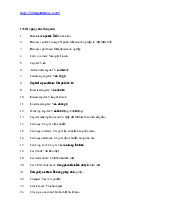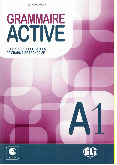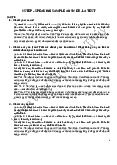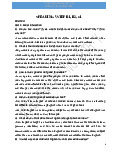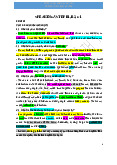







Preview text:
III. Further reading:
1. Read the text and questions below. For each question, mark the letter next to the
correct answer A, B, C or D.
Whenever I tell people what I do for a living, they can hardly believe this job exists. But
I'm not joking! I spend my days at work eating chocolate! Tasting the chocolate is an essential
part of making sure that customers get perfect bars of high-quality chocolate from the company I work for.
Every week I receive samples, small amounts that show what the chocolate is like, from
our factory and I have to check them for taste, texture and smell. I also have to taste the raw
materials we usually use -the nuts, fruit and so on. I spend days choosing the most suitable ones to go into the chocolate.
Just beside my company office I have a kitchen where I can test and taste products I
make - and I keep my colleagues happy by giving them samples! My kitchen is full of machine
and ingredients to play with. It's wonderful to have a private space I can go off to during the day.
No two days are the same in this job. Sometimes I am at our food lab and others. I'm in
the country buying our raw materials and as I've got a young family that can be difficult. But
that kind of variety, and lack of routine, is something I love about the job, although I think it still
comes second to the chocolate itself! The question I get asked most is whether I get bored of
chocolate. I've worked with it for a long time, and I've never felt I didn't want to eat it. In fact, I'll
often go home and eat some more in the evening!
1. What is James Waltham doing in the text? A.
recommending the best ways to test chocolate B.
describing what personal qualities are needed to do his job C.
telling readers what makes his job worth doing for him D.
suggesting different methods of making chocolate
2. James says that when he tells people about his work, they A.
say they would like to do the same thing. B. doubt whether he is serious. C. think it must be very easy. D.
wonder why he chose it as a career.
3. James says that working in his kitchen involves A.
trying various different preparation methods. B.
checking the quantities of ingredients in each bar. C.
discussing his opinions with other members of staff. D.
making sure the best chocolate-making equipment is used.
4. What does James think is a disadvantage of his job? A.
He sometimes feels he has eaten too much chocolate. B.
He finds it difficult to have a routine with his work. C.
He has worked with the same product too long. D.
He needs to travel abroad some of the time.
5. Which one would be an advert for the chocolate company James works for? A
Every single bar of chocolate that leaves B
We choose only the best ingredients - just
our factory is tested for its taste.
chocolate beans, sugar and milk. We don't add anything else. C
We're proud of being so environmentally D
We check everything that goes into our
friendly - all our ingredients are bought
chocolate, so that you can enjoy the best from local businesses. chocolate possible.
2. Read the text and questions below. For each question, mark the letter next to the correct answer A, B, C or D.
I work at a US university where my team and I are trying to learn more about water
birds, particularly one called the American black duck. And we've just started using an exciting
piece of equipment called a “night- vision scope”, which allows us to see the ducks in the dark!
We're worried about black ducks mainly because their numbers have fallen hugely and
we don't know whether there's enough food on the east coast for these animals. There's lots of
information about their daytime activities, but nothing about what they do at night, because we
simply haven't had the equipment. But this new “cope” will produce really clear pictures, even
on moonless nights, so we'll be able to find out more and make better decisions about looking
after the area where they live based on what we learn.
It is very hard work. There are four of us, each working six hours daily. We've studied
ducks in different locations, and I've had to take a boat to some sites and make notes on every
duck I see. The weather hasn't helped - some nights are mild, but more often it's wet. Oh, and
it's so quiet I've needed lots of coffee to stop me falling asleep! We've only missed one working
day so far, because the snow was too deep even for our special snow vehicles.
Still I like the challenge of it, especially compared to what the summer will bring – hours in
laboratory, where we'll look at our results together. It’ll be hard to be stuck inside - but it's
essential to do this. And I wouldn't change it for anything!
1. What is Sam Prentice doing in the text? A.
describing how he became a wildlife biologist B.
explaining how he is doing a piece of research C.
suggesting how readers can learn about one type of bird D.
gving a report of success he's had in his work
2. What is Sam hoping to discover about American black ducks? A.
what their behaviour is like after dark B.
which kind of food they need to live on C.
which animals are responsible for the fall in their numbers D.
what makes the east coast a suitable location for them
3. When Sam spends long periods watching ducks, he A.
dislikes having to deal with low temperatures. B.
finds there's enough to do to maintain his interest. C.
is glad of the chance to be in a quiet place. D.
sometimes finds it difficult to stay awake.
4. What does Sam say about working inside a lab over the summer? A.
He feels pleased that he'll avoid the hot weather. B.
He accepts that it's a necessary part of his job. C.
He's looking forward to studying his results. D.
He's glad he'll be working with other people.
5. What might Sam say about his experiences of working outdoors? A.
Having the right vehicle for bad B.
We decided that we'd only go to sites that weather has meant we've still
were easy to get to, and I'm really glad we
carried on working, whatever it's made that decision. been like outside. C. Sometimes the moon hasn't been D.
The other people in my team are brilliant, very bright, but our equipment
but it's been hard watching ducks in the
provides the amount of light we same place every day. need to collect information.
3. Read the text and questions below. For each question, mark the letter next to the correct answer A, B, C or D.
Last week I went to visit Atlantic College, an excellent private college in Wales.
Unusually, it gives young people much needed experience of life outside the classroom, as well
as the opportunity to study for their exams. The students are aged between 16 and 18 and
come from all over the world, spend the morning studying. In the afternoon they go out and do
a really useful activity, such as helping on the farm, looking after people with learning
difficulties, or checking for pollution in rivers.
One of the great things about Atlantic College students is that they come from many
different social backgrounds and countries. As few can afford the fees of £20,000 over two
years, grants are available. A quarter of the students are British and many of those can only
attend because they receive government help.
“I really admire the college for trying to encourage international understanding among
young people", as Barbara Molenkamp, a student from the Netherlands, said. "You learn to live
with people and respect them, even the ones you don't like. During the summer holidays my
mother couldn't believe how much less I argued with my sister.”
To sum up, Atlantic College gives its students an excellent education, using methods which really seem to work.
1. What is the writer trying to do in the text? A.
give an opinion about a particular student B.
give an opinion about a special type of education C.
describe the activities the students do in their free time D.
describe his own experience of education
2. What can a reader find out from this text? A.
how to become a student at Atlantic College B.
what kind of programme Atlantic College offers C.
what the British education system is like D.
how to get along better with other people
3. What is the writer's opinion of Atlantic College? A.
It doesn’t allow students enough study time. B.
Its students are taught to like each other. C.
It doesn’t give good value for money. D.
Its way of teaching is successful
4. Since being at Atlantic College, Barbara A.
has learnt a lot about other countries. B.
has become more confident than her sister. C.
finds it easier to get on with other people. D.
prefers her new friends to her family.
5. Which advertisement uses correct information about Atlantic College? A. Study at Atlantic College. B. Study at Atlantic College. Courses for 16-18 year olds. Courses for 16-18 year olds. Lessons all morning, Morning lessons and afternoon sport in the afternoon. activities. Help with fees available. C. Study at Atlantic College. D. Study at Atlantic College.
Classes on international topics.
Learn English in a beautiful place. Many free places available. Lots of weekend activities. Students of all ages welcome. Help with fees available.
4. Read the text and questions below. For each question, mark the letter next to the correct answer A, B, C or D.
If you want to take the whole family on holiday, and keep everybody happy, then I have
found just the place for you. I recently went with a group of friends to stay at the Greenwood
Holiday Village, which is open from May until October.
Built in the centre of a forest, Greenwood is a great place to stay whatever the weather.
Its main attraction for families is the indoor World of Water, where young and old can have fun
in the different pools. Some of these, however, are for serious swimmer only.
For sporty people, the Country Club offers tennis, squash and badminton. If your
children are too young to join in these sports, there are activity clubs. Greenwood is a good
place for families as it is traffic-free - you explore on foot or by bike. Some people complained
that this was inconvenient, but I was pleased to be out in the fresh ar. For evening
entertainment, there are shows and cinemas.
Accommodation is in a variety of apartments of different sizes. These have up to four
bedrooms, a kitchen and a bathroom, as well as a dining area. Before going, I thought the
apartments might not be big enough for all of us, but I was pleasantly surprised - it was not too crowded at all.
I’ll definitely go back to Greenwood next year. Why don't you give it a try? Visit their
website for further information now!
1. What is the writer's main purpose in writing this text? A.
to give her opinion of the holiday village B.
to describe what her family did at the holiday village C.
to give advice to a friend going to the holiday village D.
to complain about the holiday village.
2. From the text, the reader can find out A.
the best way to get to the holiday village. B.
the best time of year to visit the holiday village. C.
what activities are available at the holiday village. D.
how to reserve accommodation at the holiday village.
3. What does the writer think about the holiday village? A.
The apartments there are not big enough. B.
It is not convenient because you cannot use your car. C.
It can only be enjoyed in good weather. D.
There is something there for all ages.
4. What does the writer say about the apartments? A.
There is not much space between them. B.
Each one has its own bathroom. C. They all have four bedrooms. D.
Not all of them have dining areas.
5. Which postcard would somebody send from the holiday village? A. Dear Jane, B. Dear Jane,
The children love the beach and all
As it's April, the weather isn’t good,
the activities. We've got a lovely 4-
but it doesn’t matter as there's a lovely bedroom apartment. swimming pool. Love, Love, Ann Ann C. Dear Jane, D. Dear Jane,
My parents love the swimming pool,
We're a bit disappointed that we have
and the children love riding around
to drive everywhere, but there’s a lot
the forest on their bicycles. to see and do. Love, Love, Ann Ann
5. Read the text and questions below. For each question, mark the letter next to the correct answer A, B, C or D.
Orbis is an organization which helps blind people everywhere. It has built an eye hospital
inside an aeroplane and flown it all over the world with an international medical team.
Samantha Graham, a fourteen-year-old schoolgirl from England, went with the plane to
Mongolia. Samantha tells the story of Eukhtuul, a young Mongolian girl.
"Last year, when Eukhtuul was walking home from school, she was attacked by boys with
sticks and her eyes were badly damaged. Dr Duffey, an Orbis doctor said that without an
operation she would never see again. I thought about all the everyday things I do that she
couldn't, things like reading schoolbooks, watching television, seeing friends, and I realized how lucky I am."
“The Orbis team agreed to operate on Eukhtuul and I was allowed to watch, together
with some Mongolian medical students. I prayed the operation would successful. The next day I
waited nervously with Eukhtuul while Dr Duffey removed her bandages. "In six months your
sight will be back to normal," he said. Eukhtuul smiled, her mother cried, and I had to wipe away some tears, too!"
“Now Eukhtuul wants to study hard to become a doctor. Her whole future has changed,
thanks to a simple operation. We should all think more about how much our sight means to us.
1. What is the writer's main purpose in writing this text? A. to describe a dangerous trip B. to report a patient's cure C.
to explain how sight can be lost D.
to warm against playing with sticks
2. What can a reader learn about in this text? A.
the life of schoolchildren in Mongolia B.
the difficulties for blind travellers C.
the international work of some eye doctors D.
the best way of studying medicine
3. After meeting Eukhtuul, Samantha felt A. grateful for her own sight. B. proud of the doctor’s skill. C.
surprised by Euktuul's courage. D.
angry about Eukhtuul's experience.
4. what is the result of Eukhtuul's operation? A.
She can already see perfectly again. B.
After some time she will see as well as before. C.
She can see better but will never have normal eyes. D.
Before she recovers, she will need another operation.
5. Which is the postcard Samantha wrote to an English friend? A.
I’ve visited a Mongolian hospital B.
You may have to fly a long way to have
and watched local doctors do an
the operation you need, but the journey operation. will be worth it. C. I'm staying with my friend D.
Make sure you take care of your eyes
Eukhtuul, while I'm sightseeing in
because they're more valuable than you Mongolia. realize!
